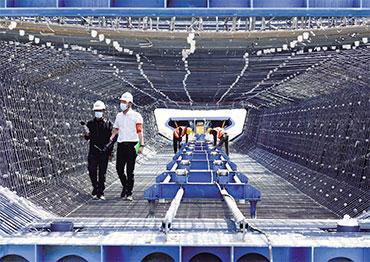Since taking effect in 2002, the EIA Law designated the environmental protection department under the State Council as the only authority to license an EIA agency. For a long time, businesses that engaged in performing EIAs were mostly environmental science institutes and academies affiliated with government environmental protection bureaus at different levels, from local to national. The two agencies were closely connected, with officials and experts sharing office buildings and promotion opportunities regardless of their different duties.
However, in March 2015, the two parties were ordered to disassociate before the end of 2016 when the first amendment of the law took effect. The amendment stipulated that EIA agencies should not have conflicts of interest with environmental protection authorities.
At the end of 2018, the second amendment of the EIA Law took effect. It further loosened control over who could conduct EIAs, enabling more agencies to register, but with a much lower regulatory threshold.
As a result, the new law enables a person to set up multitudes of firms with just one nominal EIA engineer, who does not need to work for any particular EIA agency. The engineer needs only to provide his or her signature on the EIA report, a literal rubber stamp procedure.
On October 25, 2019, the MEE set up the online EIA Credit Platform as the supervisory body to track all registered EIA agencies. Misconduct is recorded on the platform.
“We’ve noted some people registered dozens of agencies on the [Credit Platform] website. So to many of them, removing one from the platform makes little difference,” Green Data’s Xiang told News- China. Other entities under the control of the same person can still operate as long as the EIA engineer is unaffected, Xiang said.
A certified EIA engineer should conduct on-site research, attend approval meetings and write reports before signing off on a project. However, many agencies just pay zombie engineers for their signature. They may not even sign their name themselves. The signatures on reports or brochures cost from hundreds to tens of thousands of yuan according to the signer’s seniority.
Cost saving is the primary incentive for paying zombie engineers. In 2019, the China Economic Herald reported on a zombie engineer surnamed Sun who had signed a three-year contract with an EIA agency. According to the agreement, the institute would pay Sun, who certified, 40,000 yuan (US$5,932) a year to sign off on projects. It is much cheaper than hiring an EIA engineer to conduct real assessments, where annual salaries are at least 100,000 yuan (US$14,784). Among the EIA engineers, novices who earn less are usually more willing to sign off on projects than veterans.
The risk of signing problematic EIA reports also boosted demand for zombie engineers. According to an anonymous EIA engineer in Guangdong Province, many EIA engineers will ask their employers to pay for signatures from engineers registered with other firms rather than sign their own names, because they do not want to shoulder the responsibility for projects proceeding under their assessments. “If other people sign, there won’t be any penalties imposed on the true EIA engineer once the projects are found to be problematic,” the EIA engineer said.
He cited a case in Guangdong Province. When they conducted an EIA report on a furniture company that used a high-volatility oil varnish already banned in the province, no one wanted to sign off on it.
Because of the risk, becoming an EIA engineer is not as attractive as before for young professionals. Cai said the shortage of EIA engineers has therefore fueled the need for zombie engineers, driving up their annual salary from about 50,000 yuan (US$7,395) to more than 100,000 yuan (US$14,784).

 Old Version
Old Version


